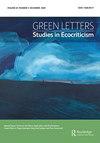论抒情的耻辱与灭绝
Q1 Arts and Humanities
引用次数: 0
摘要
根据联合国2019年发布的一份报告,到2100年,将有多达100万种物种面临灭绝。如此大规模的损失超过了语言。借鉴丹尼斯·莱利关于语言自主性的研究,这篇文章认为,考虑语言的灭绝涉及到语言在其语境之外说话的能力。考虑到40%的两栖动物正面临灭绝的威胁,本文考察了保罗·马尔登、凯瑟琳·杰米和瓦尼(安东尼·以西基尔)·卡皮尔迪奥的三首关于青蛙的诗,作为莱利“抒情羞耻”概念的例子,诗人承认“语言本身的声音……试图说话”。着重于典故、撇号和短语(诗的方方面面,涉及一个clinamen,一个远离或转向主题),它认为抒情诗——作为一个场合,羞耻产生了歌曲——也可以是一个工具,遭遇长期被忽视的非人类声音的哀叹。本文章由计算机程序翻译,如有差异,请以英文原文为准。
On Lyric Shame and Extinction
ABSTRACT According to a UN report published in 2019, up to one million species face extinction by 2100. Such a scale of loss outpaces language. Drawing on Denise Riley’s work on the autonomy of language, this article argues that contemplating extinction involves attending to language’s capacity to speak outside its context. Mindful of the 40% of amphibian life under threat of extinction, it examines three poems about frogs, by Paul Muldoon, Kathleen Jamie, and Vahni (Anthony Ezekiel) Capildeo, as instances of Riley’s concept of ‘lyric shame’, where the poet acknowledges the ‘voice of language itself … trying to speak’. Focusing on allusion, apostrophe, and ekphrasis (facets of the poem that involve a clinamen, a turn away from or towards the subject) it argues that the lyric poem – as an occasion where shame gives rise to song – can also be a vehicle for encountering the lament of long-neglected non-human voices.
求助全文
通过发布文献求助,成功后即可免费获取论文全文。
去求助
来源期刊

Green Letters
Arts and Humanities-Literature and Literary Theory
CiteScore
0.50
自引率
0.00%
发文量
38
期刊介绍:
Green Letters: Studies in Ecocriticism explores the relationship between literary, artistic and popular culture and the various conceptions of the environment articulated by scientific ecology, philosophy, sociology and literary and cultural theory. We publish academic articles that seek to illuminate divergences and convergences among representations and rhetorics of nature – understood as potentially including wild, rural, urban and virtual spaces – within the context of global environmental crisis.
 求助内容:
求助内容: 应助结果提醒方式:
应助结果提醒方式:


